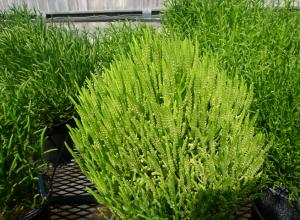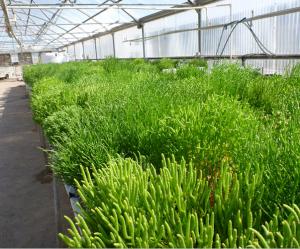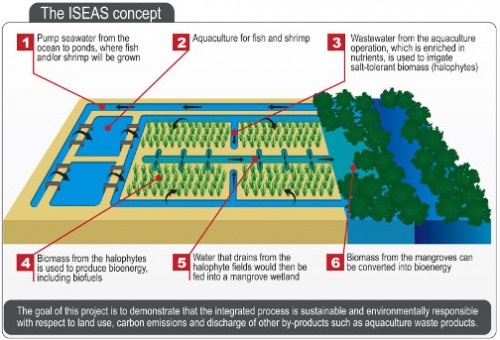
Even though the airline industry has already flown jets using biofuels made from jatropha, camelina and sugar cane, as well as from cooking oil, Boeing, Etihad Airways (the national airline of the United Arab Emirates) and the Masdar Institute of Science and Technology just announced they've found a breakthrough feedstock: halophytes. These plants, which are adapted to a saline environment, have seeds that contain enough oil to produce biofuel more efficiently than other well-known feedstocks. (press release)
Boeing also touted that halophytes avoid two of the biggest pitfalls of first- and second-generation biofuels, which rely on freshwater and arable land, causing the cruel competition between food and fuel, which, in the past, has raised commodity prices and caused food riots.
Native to the United States
In the United Arab Emirates, Masdar scientists found that halophytes can grow in the desert, not just marginal land like jatropha; more importantly, the plant can be irrigated with saltwater, completely avoiding water competition. That sold Boeing on the project, Darrin Morgan, the director of sustainable biofuel strategy at Boeing, told The National.
Native to the coast of the United States and known as the Salicornia bigelovii or dwarf glasswort, this particular halophyte has been researched at Masdar since 2009 when a joint-funded consortium was established between Etihad Airways, Boeing and the technology company Honeywell.
"We are developing the basics of a new agriculture system," Morgan had said. "If you can

do it here, you can do it in less extreme environments."
While the seeds contain enough oil for biofuel production, the plant itself - high in sugar and low in lignin - can also be broken down into biofuel more easily than other cellulosic plants.
Dr Alejandro Rios, director of the Sustainable Bioenergy Research Consortium, tested the plant's ability to grow locally at the International Centre for Biosaline Agriculture in Dubai. "We collected seeds from a few varieties from Texas and we tested the fields at different salinities and we got pretty good results."
The Integrated Seawater Energy and Agriculture System
He said now the challenge was how to grow large yields of the crop in the United Arab Emirates in a cost-effective manner. His team believes this can be achieved through its Integrated Seawater Energy and Agriculture System, a concept in which aquaculture is coupled with growing the Salicornia.
In the coming year, SBRC scientists will create and test their system by planting two crops of halophytes in Abu Dhabi's desert soil. Sea water filled with effluent from a nearby fish and shrimp farm will nourish halophytes that clean the water as they grow. Next the water will flow into a field of mangroves before returning to the ocean. Finally, both plants will be converted into biofuel.

Becoming a leader in sustainable feedstocks
The pilot facility (a couple hectares in size) is being built in Abu Dhabi for testing that will start in 2015. After 2 years of testing - and if all goes well - a larger facility (500 hectares in size) could go up before that first test period is finished. Commercial production (thousands hectares) could start soon after.
"The UAE has become a leader in using desert land and seawater to grow sustainable biofuel feedstocks," said Rios. "This project can have a global impact, since 97 percent of

the earth's water is ocean and 20 percent of the earth's land is desert."
SBRC's research success continues the momentum for a sustainable aviation biofuel industry in Abu Dhabi. On 18 January, Etihad Airways conducted a demonstration flight with a 777-300ER powered in part with biofuel refined in the UAE.
On 19 January, Boeing, Etihad Airways, Masdar Institute and others launched BIOjet Abu Dhabi: Flight Path to Sustainability, an initiative to advance biofuel research, feedstock production, and refining capability.


